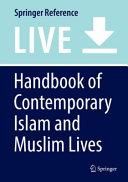
Handbook of Contemporary Islam and Muslim Lives
This is a comprehensive handbook which for the first time provides a general yet detailed discussion of contemporary Islam and various aspects of Muslim lives. It offers a much needed tool for an introduction to the world of contemporary Muslim life and debate, and a link of continuity between the Muslim world and Muslims living and born in the West. The reader gains access to articles by leading scholars who observe phenomena in a post-9/11 context and from a global viewpoint. The topics have been carefully selected to provide the reader with both the necessary general view that a good handbook must offer while presenting details and information, as well as ethnographic examples, to inspire further research and interest. Indeed, each chapter will offer topical reading suggestions from which one can expand the material discussed in the chapter. The approach of the handbook is mainly social-anthropological, but attention is given to other disciplines like history, geography, political studies, as well as gender studies and cultural studies.
- ISBN 13 : 9783319736532
- ISBN 10 : 3319736531
- Judul : Handbook of Contemporary Islam and Muslim Lives
- Pengarang : Mark Woodward, Ronald Lukens-Bull,
- Kategori : Religion
- Penerbit : Springer
- Bahasa : en
- Tahun : 2018
- Google Book : http://books.google.co.id/books?id=yPNMygEACAAJ&dq=intitle:Contemporary+Islamic+Studies&hl=&source=gbs_api
-
Ketersediaan :
This is a comprehensive handbook which for the first time provides a general yet detailed discussion of contemporary Islam and various aspects of Muslim lives.

